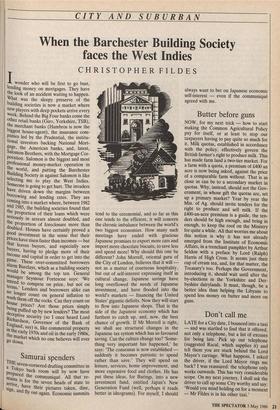Samurai spenders
THE seven-cornered drafting committee in a Tokyo back room will by now have prepared the communiqué. All that re- moms is for the seven heads of state to arrive, have their pictures taken, cline, Sign, and fly out again. Economic summits tend to the ceremonial, and so far as this one tends to the efficient, it will concern the chronic imbalance between the world's two biggest economies. How many such meetings have ended with gracious Japanese promises to export more cars and import more chocolate biscuits, to save less and spend more! Why should this one be different? John Morrell, oriental guru of the City of London, believes that it will — not as a matter of courteous hospitality, but out of self-interest expressing itself in cultural change. Japanese savings have long overflowed the needs of Japanese investment, and have flooded into the world's markets — financing the United States' gigantic deficits. Now they will start to flow into Japanese shops. That is the side of the Japanese economy which has furthest to catch up, and, now, the best chance of growth. If Mr Morrell is right, we shall see structural changes in the Japanese tax system which has so favoured saving. Can the culture change too? 'Some- thing very important has happened,' he says: 'The consensus is now established — suddenly it becomes patriotic to spend rather than save.' They will spend on leisure, services, home improvement, and more expensive food and clothes. He has put these ideas, for Barings, into a new investment fund, entitled Japan's New Generation Fund (well, perhaps it reads better in ideograms). For myself, I should always want to bet on Japanese economic self-interest — even if the communiqué agreed with me.


















































 Previous page
Previous page